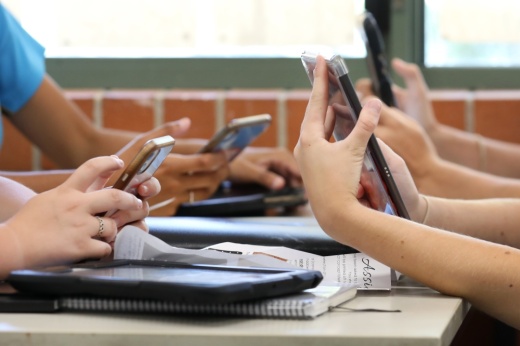The new rule was unanimously approved by the NBISD board of trustees during a regular meeting on Aug. 11. The measure falls under one of the several required updates passed into law following the 89th Texas Legislative session, according to board documents. Districts can implement their own procedures to enforce the law.
“While this is a state-mandated change, NBISD remains committed to implementing this law in a way that best supports our students, educators and families,” Arterbury said in a news release. “Our district and campus leadership teams have worked thoughtfully to develop the plan below, which reflects both the spirit of the law and the needs of our local community.”
Diving in deeper
The use of personal communication devices—including cell phones or other electronic devices—on school property during the school day is now prohibited. Students will be required to store the device in accordance with the method of storage the district establishes, according to agenda documents.
“Those devices include, but may not be limited to, in the future, telephones, cell phones, tablets, smart watches, radio devices, paging devices, or any other device now or in the future that would be capable of telecommunication or digital communication that has not been provided by the campus,” Chief of Schools Wade Ivy said.
According to a news release, the NBISD Personal Communication Device Practice will be followed by all district campuses as follows:
Administrative regulations
- Devices are expected to be turned off or silenced and out of sight at the official start of the school day, but may remain in the student’s possession during the day. Students may turn their devices on at dismissal.
- Personal devices utilized in common areas during the school day—including hallways and cafeterias—will have the device confiscated by a staff member, according to the news release.
Classroom consequences
- 1st violation: students will be given a verbal warning to turn off or put away the device.
- 2nd violation: the student will turn in the device to the teacher, who will hold it for the duration of class. The teacher will notify the parents.
- 3rd violation: the devices will be turned over to the office for the duration of the school day.
- 1st office violation: the device will be held in the office for the duration of the school day. Students will be able to pick up the device after school.
- Additional violations: the devices will be held in the office for the duration of the school day. A parent or guardian must pick up the device after school, and additional consequences may occur.
Offenses will reset every semester, according to Chief of Schools Matthew DeLoach.
The state adopted the following exemptions to the law regarding the ban on personal communication devices:
- If the student’s use is necessary for the student’s individualized education program, a 504 plan or something similar.
- If there is a documented need based on a directive from a qualified physician.
- The student’s use is necessary to comply with a health or safety requirement imposed by law, or as part of campus safety protocols.
The background
The Texas Senate unanimously passed House Bill 1481 on May 25, and the legislation was sent to Gov. Greg Abbott’s desk for final approval on June 20. The proposal, which was passed by the Texas House in April, would mandate that districts adopt policies banning the use of personal communication devices during the school day, according to previous Community Impact reporting.
“As with any change, we know this will be an adjustment period,” Arterbury said in the news release. “We are fully confident that our staff and students will work together to ensure that this is a smooth transition.”





